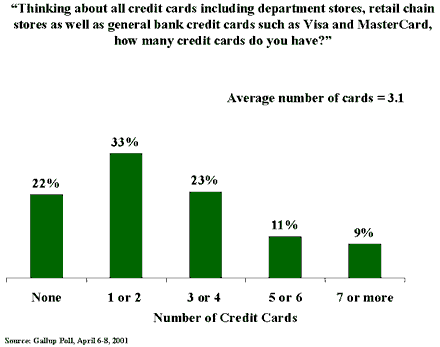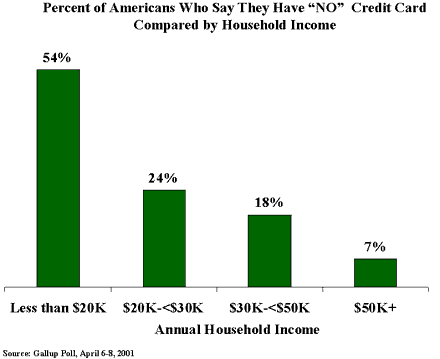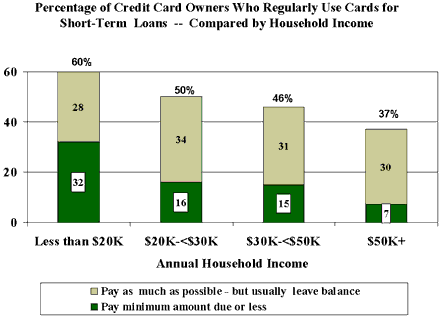GALLUP NEWS SERVICE
PRINCETON, NJ -- Credit cards have become one of the most important means of financial transactions in modern American life, providing people with immediate cash and credit -- although often at a steep price. A recent Gallup poll shows that 76% of Americans say they have a credit card, with 43% claiming to own three or more cards. And 41% of those who have credit cards (32% of Americans overall) indicate they regularly use the credit cards for short-term loans -- by not paying off the full monthly balance, so that the left-over amount is rolled over and subjected to the double-digit interest rates charged by most credit card companies.
The poll was conducted April 6-8, 2001, and shows that 22% of Americans say they have no credit card, while 33% have from one to two cards, 23% have three to four cards, and 20% have five or more cards. The average number of cards reported by respondents is 3.1.

While just 22% of Americans say they do not have a credit card, that number varies considerably among people by their level of income. As shown below, more than half of the lowest-income Americans (54%) are able (or forced) to manage without the plastic credit, compared with just 7% of the highest income group.

Ownership of credit cards is also partially related to age, with ownership lowest among the youngest and oldest age groups and highest in the two middle age groups. Almost a third of adults (32%) under the age of 30 own no card, while 26% of Americans in the retirement years (65 and over) own none. However, less than one in five of the two middle age groups say they own no card -- 19% of the 30-49 age group, and 17% of the 50-64 age group.
Less Than Half of Americans Always Pay Off Monthly Balance
The poll also shows that only 42% of Americans who have credit cards say they always pay off the full amount of their credit card balances each month, while another 16% say they usually do. That leaves 41% of credit card owners -- or almost a third of Americans overall -- who regularly leave some part of the balance to roll over to the next month, including 29% who say they pay as much of the balance as they can, although they usually leave some balance; 11% who usually pay only the minimum balance due; and 1% who sometimes pay less than the minimum amount due.
In effect, people who fail to pay off the full amount of the balance each month are taking out very costly loans, with the interest rates typically higher for lower-income people whose credit ratings are not as solid as higher-income Americans. As shown below, among credit card owners with the lowest level of annual household incomes, 60% regularly use their credit cards to obtain short-term loans, compared with 37% of credit card owners whose annual income is $50,000 or more. The difference is found primarily in the percentage who pay the minimum amount possible -- almost a third (32%) of lowest-income people, compared with just 7% of the highest income group.

The likelihood of using the credit card for short-term loans is also higher among younger than older people. About half of those under the age of 50 do so, compared with 33% of Americans in the 50-64 age group, and just 20% of those 65 and older.
People who say their financial situation is in excellent or good shape are much less likely to use the credit card for a short-term loan than are those who describe their financial situation as only fair or poor. More than half (54%) of the latter group do not usually pay off their full balance, including 22% who pay only the minimum amount due. By contrast, among those with a more favorable financial situation, only 31% do not usually pay off their full balance, including just 6% who make a minimum payment.
The poll shows that about 18% of all Americans are worried that they will not be able to make the minimum payment of their credit card balance. Among this group, about a quarter (25%) can always or usually pay the full amount, but 74% pay a lesser amount -- thus incurring high interest rate charges on their loans.
Survey Methods
Current results from the Gallup Poll are based on telephone interviews with -- 1,025 -- national adults, aged 18+, conducted April 6-8, 2001. For results based on the total sample of National Adults, one can say with 95% confidence that the margin of sampling error is +/- 3 percentage points.
In addition to sampling error, question wording and practical difficulties in conducting surveys can introduce error or bias into the findings of public opinion polls.
Thinking about all credit cards including department stores, retail chain stores as well as general bank credit cards such as Visa and MasterCard, how many credit cards do you have?
|
2001 Apr 6-8 |
|
|
None |
22 |
|
1-2 |
33 |
|
3-4 |
23 |
|
5-6 |
11 |
|
7 or more |
9 |
|
No opinion |
2 |
|
Mean (including zero) |
3.10 |
|
Median (including zero) |
2 |
|
Mean (excluding zero) |
4.00 |
|
Median (excluding zero) |
3 |
How do you generally pay your credit card(s) each month -- [RANDOM ORDER: do you always pay the full amount, do you usually pay the full amount, but not always, do you always pay as much as you can, but usually leave balances, do you usually pay the minimum amount due, but not much more, (or) do you sometimes pay less than the minimum amount due]?
based on -- 837 -- with at least one credit card; ±4 pct. pts.
|
|
|
Always pay as much |
|
|
|
|
|
|
2001 Apr 6-8 |
42% |
16 |
29 |
11 |
1 |
1 |
* |
|
*Less than 0.5% |
|||||||
|
(vol.)=Volunteered response |
|||||||

